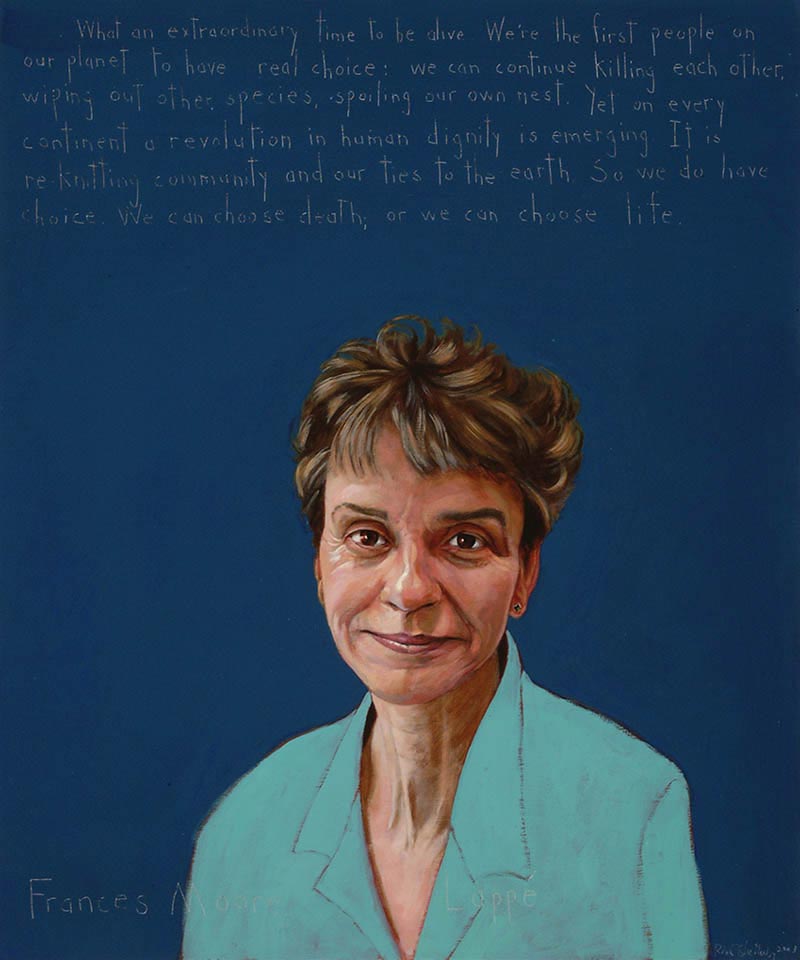
Frances Moore Lappé
Writer, Activist : b. 1944
“What an extraordinary time to be alive. We’re the first people on our planet to have real choice: we can continue killing each other, wiping out other species, spoiling our nest. Yet on every continent a revolution in human dignity is emerging. It is re-knitting community and our ties to the earth. So we do have a choice. We can choose death; or we can choose life.”
Biography
Frances Moore Lappé was born in Pendleton Oregon. A graduate of Earlham College in Indiana, she was a “26-year-old trusting her common sense” when she began the research that led to the publication of Diet for a Small Planet (1971), a book which sold over three million copies and changed forever the way people think about food. Her little book showed that human practices, not natural disasters, cause worldwide hunger. Food scarcity results when grain, rich in nutrients and capable of supporting vast populations, is fed to livestock to produce meat which yields only a fraction of those nutrients.
In Food First:Beyond the Myth of Scarcity (written with Joseph Collins, 1977) she went on to identify other causes of starvation that included the centralized control of farmland and economic pressures to produce “cash” crops rather than basic food products. The authors argued that western colonization of underdeveloped countries create conditions for waste and poor distribution of food resources that allow whole populations to go hungry. Their vision for feeding the world is referred to as “food self-reliance,” in which communities produce the food they consume and manufacture the tools and fertilizers that they need.
A passion for the democratic process infuses her work. Lappé is a co-founder of two national organizations: the Institute for Food and Development Policy based in California and the Center for Living Democracy, a ten-year initiative which encourages “regular citizens to contribute to problem-solving in all dimensions of public life.” In 1987, Lappé became the fourth American to receive the Right Livelihood Award, sometimes called the “Alternative Nobel,” for her “vision and work healing our planet and uplifting humanity.”
In 2002, Lappe and her daughter, Anna, published Hope’s Edge: The Next Diet for a Small Planet. Like other visionary leaders, Lappé sees hope as something to be lived not sought after: “A lot of people think we find hope by marshaling evidence and proving there is grounds for it. But hope isn’t what we find in evidence; it’s what we become in action.” It is not surprising, then, that her next book is called Choosing Courage in a Culture of Fear.
Programs
Americans Who Tell the Truth (AWTT) offers a variety of ways to engage with its portraits and portrait subjects. Host an exhibit, use our free lesson plans and educational programs, or engage with a member of the AWTT team or portrait subjects.

Education
AWTT has educational materials and lesson plans that ask students to grapple with truth, justice, and freedom.

Exhibits & Community Engagement
AWTT encourages community engagement programs and exhibits accompanied by public events that stimulate dialogue around citizenship, education, and activism.